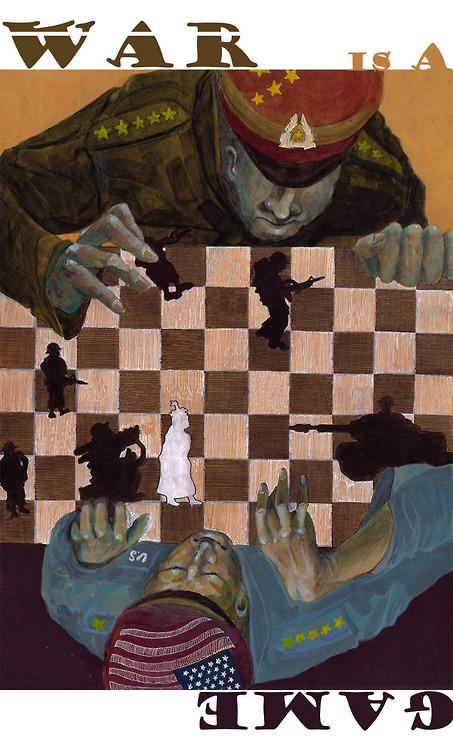
Chess is War. What Principles Guide it?
When the game of chess came into being in its prehistory, it was a war game (either an aid to plan strategy and tactics, or substitute for bloodless warfare). So to understand chess you need to understand the methods of classical warfare. And I think it is exactly in this way chess should be executed.
A military commander conducting war, or a chess player conducting his pieces, they both need some form of mental framework to shape their battles; sort of “mental maps” to navigate the complex problems of warfare: initiative, attack, defense, counterattack, strategy, tactics. It is essential for both commanders to have a set of principles or techniques to help them successfully guide the conduct of war.

To gain greater control of their battles and maximize their victories, commanders on the battlefield, and over the chessboard alike, have to prepare for war and master all three components of warfighting skills:
- Physical,
- Moral,
- Conceptual.
The physical component is power of men (in chess, both Generals start the battle with equally strong armies, and it is only when one side becomes much superior in force when this component rises in importance).
Then there is the moral component, for example motivation or determination for getting things done.
All military action is permeated by intelligent forces and their effects, –von Clausewitz
Finally, what interests us most here is the conceptual component which provides the thought processesnecessary to develop the ability to fight. This most important non-physical component that affects the conduct of the battle at the strategic and tactical levels deals with principles of war.
These non-physical factors are predominant in all decisions of the Strategist.
In war, the non-physical is to the physical as three to one, –Napoleon
The principles of war describe these mental forces at work in every competitive situation. You won’t win the war through violence alone. Effective management of confrontation of any kind depends on the ability to apply force in a measured and deliberate fashion by using the key principles of warfare.
Thus we need a thorough understanding of them to learn what it takes to fight and win in the world, be it war, chess, work, or daily life.

War games, by Jacek Yerka
For at least 2,500 years, from the ancient Chinese and Greek onward to the Italians of the middle ages and the French, British, Germans and Americans of modern times, military leaders have tried to identify the most effective ways to conduct war and employ these basic time-honored principles in real conflicts.
As an illustration (we’ll cover the war principles in a more detail later), here are the ten war principles from the 2011 edition of British Defence Doctrine:
- Selection and Maintenance of the Aim
- Maintenance of Morale
- Offensive Action
- Security
- Surprise
- Concentration of Force
- Economy of Effort
- Flexibility
- Cooperation
- Sustainability
On these constantly turns the issue of the confrontation on the battlefield, including the chessboard. In the history of warfare, these form the more constant factors, while the physical elements change in every warring situation and throughout epochs.
* * *
The above principles guide all chess war battles. Military generals and Chess Masters, they use them all the time, instinctively and automatically, so they might be totally unaware of it though. But no doubt, all their knowledge revolves around the major war principles and they "construct" solutions out of them.
[this is a replica of the original post at http://iPlayooChess.com/]